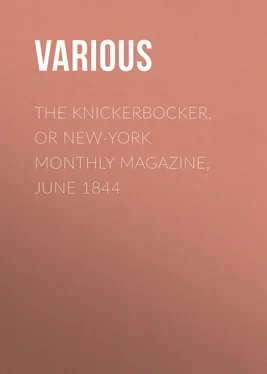Various - The Knickerbocker, or New-York Monthly Magazine, June 1844
Здесь есть возможность читать онлайн «Various - The Knickerbocker, or New-York Monthly Magazine, June 1844» — ознакомительный отрывок электронной книги совершенно бесплатно, а после прочтения отрывка купить полную версию. В некоторых случаях можно слушать аудио, скачать через торрент в формате fb2 и присутствует краткое содержание. Жанр: foreign_antique, periodic, foreign_edu, на английском языке. Описание произведения, (предисловие) а так же отзывы посетителей доступны на портале библиотеки ЛибКат.
- Название:The Knickerbocker, or New-York Monthly Magazine, June 1844
- Автор:
- Жанр:
- Год:неизвестен
- ISBN:нет данных
- Рейтинг книги:5 / 5. Голосов: 1
-
Избранное:Добавить в избранное
- Отзывы:
-
Ваша оценка:
- 100
- 1
- 2
- 3
- 4
- 5
The Knickerbocker, or New-York Monthly Magazine, June 1844: краткое содержание, описание и аннотация
Предлагаем к чтению аннотацию, описание, краткое содержание или предисловие (зависит от того, что написал сам автор книги «The Knickerbocker, or New-York Monthly Magazine, June 1844»). Если вы не нашли необходимую информацию о книге — напишите в комментариях, мы постараемся отыскать её.
The Knickerbocker, or New-York Monthly Magazine, June 1844 — читать онлайн ознакомительный отрывок
Ниже представлен текст книги, разбитый по страницам. Система сохранения места последней прочитанной страницы, позволяет с удобством читать онлайн бесплатно книгу «The Knickerbocker, or New-York Monthly Magazine, June 1844», без необходимости каждый раз заново искать на чём Вы остановились. Поставьте закладку, и сможете в любой момент перейти на страницу, на которой закончили чтение.
Интервал:
Закладка:
Here Mr. Kornicker concluded his rather extraordinary soliloquy by plunging his hands in his pockets, and dropping into a subdued whistle; in the course of which his thoughts seemed to have taken altogether a different channel; for it was not long before he said, as if in continuance of some unuttered train of thought:
‘Well, old fellow, I promised you to look after your girl, although you didn’t seem much struck with the offer. But I’ll stick to my promise; although, to tell the truth, I don’t exactly know how to commence. But nothing will be done by sitting on this bundle. So I’ll to my work at once.’
He rose up hastily, and was descending the stairs when he abruptly turned back, went up to his luggage, and after eyeing it for a minute, said:
‘It’s a hazardous business to leave you here. You can’t be distrained on, nor levied on, because you’re exempt by law. So you are safe from landlords and creditors; the law makes you exempt from being stolen too; but thieves consider themselves like members of parliament, out of the reach of law. There’s the rub. You might be stolen; and I very much regret to say, that the gentleman who should lay violent hands on you would walk off with all my goods, chattels, lands, tenements, and hereditaments; but I’ve no where to take you, and as I expect to sleep in this entry, you must take your chance. So, good bye, old acquaintance, in case you and I should never meet again.’
Having in a very grave manner shaken one corner of the counterpane, as if it were the hand of an old friend, he gave his head a sudden jerk, to settle his hat in the right place, and descended the stairs.
The task which Kornicker had imposed upon himself was by no means easy; but firm in his purpose of fulfilling his promise, he shut his eyes to all difficulties, and commenced his pursuit.
The first place to which he went was the prison, for he hoped that the keeper of it might know something about her, or that she might have left her address there, in case her father wished to see her when he was imprisoned. But he was disappointed. They could tell him nothing, except that Rust neither asked for her, nor mentioned her, and had always refused to see her. She had never succeeded in gaining admittance to him, except on the night of his death, when the jailer, a fellow unfit for his office, for he had some human feeling left, unable to resist her tears and entreaties, had let her in unannounced, as mentioned in the last chapter. She had left the cell abruptly, had hurried off, and had never returned. ‘God help the poor child!’ exclaimed the man, as he told the story. ‘Such hearts as hers were made for heaven, not for this world. I have a daughter of her age; and even if she had robbed a church, I couldn’t have treated her as that man treated his child.’
The man looked at Kornicker, as if to observe the effect of his last remark; but probably that gentleman viewed the robbing of a church in a less heinous light than the jailer, for he made no comment on it, but after a pause said:
‘So that’s all you know?’
The man nodded.
‘Good morning to you, Sir,’ said Kornicker; and he walked straight out of the building, and had crossed several streets before he had made up his mind what to do next. This however was soon settled, and he buttoned his coat tightly, pulled his hat firmly on his head, drew on a pair of shabby gloves, and performed a number of those little acts which in ancient times were known under the head of ‘girding up the loins,’ preparatory to setting out to his next point of destination, which was the girl’s former home, the place where Rust had committed the murder. It was many miles off; and the distance which Rust, under the whip and spur of fierce passions, had traversed without trace of fatigue, drew from his clerk many a sigh, and many an expression of weariness.
When he got there he found the house deserted. He entered it, for there was no one there to hinder it, but the rooms were empty and dismantled. The house had been hired by Rust, and no sooner was he in the gripe of the law, than creditors innumerable, who like birds of prey were biding their time, kept in check by the unbending character of their debtor, came flitting in from every quarter; seized and sold the furniture, and left the house desolate. A single dark stain upon the library floor, where the murdered man had fallen, was all that was left to tell a tale of the past. The dust had gathered thickly on the walls, as if preparing to commence a slumber of years; and as Kornicker went out, the rats raced through the hall, startled at the tread of a stranger.
With a heart as heavy as his limbs, as he thought of the past life of the girl who had once tenanted this house, and then fancied what her present fate must be, Kornicker set out on his return. ‘If it had been me,’ said he, pausing to take a last look at the lonely house, ‘if it had only been Edward Kornicker who was thus cast adrift, to kick his way through the world with empty pockets, and without a soul to say to him God speed, or ‘I’m sorry for you,’ it would have been right and proper, and no one would have any cause to grumble or find fault; but this being a girl, with no money, and consequently with no friends, no experience, as I have, it’s a very hard case—a very hard case, indeed.’
Having arrived at this conclusion, Kornicker took off his hat, wiped his forehead, snuffed, and set out on his return.
Day after day for several weeks he prosecuted his inquiries without success; and just when he was in despair, chance led him to success. In the course of his rambles, he encountered a person who had been at Rust’s trial, and happened to speak about him; for now that the criminal was dead and in his grave, when public opinion could be of no service to him, many who had hunted him down began to view less harshly the crime which had led to his death; and this man was one of the number. He said that, although he deserved punishment for his previous evil deeds, yet the best and purest act of his life had been that by which he had struck down the destroyer of his child.
‘Poor thing!’ said he, ‘she must have led a miserable life since her father’s death. I have met her several times since then in the street, but that was several weeks ago; and then she was very feeble, scarcely able to walk: perhaps she’s dead now.’
Kornicker waited only long enough to ascertain that she lived in a certain out-of-the-way part of the town, which the man designated, and thither he directed his steps, and resumed his search; and after several days spent in fruitless inquiries, he discovered her.
The house in which he found her was a small ruinous building, sagged and jutting forward, as if struggling to sustain itself against time and dilapidation. The windows were broken; the doors and shutters unhung, except a solitary one of the latter, which creaked as it flapped to and fro in the wind; and this was the home of Rust’s child.
Kornicker ascended the ricketty stairs and paused at the door of a room, which a slipshod woman had pointed out as that of the ‘murderer’s daughter.’ He knocked, but there was no reply; he knocked again, but all was silent. Then he opened the door and looked in.
It was a small dingy room, unfurnished, with the exception of a bed on the floor, and a single chair, on which stood a candle whose flaring light served only to add to the gloom of the room by revealing its wretchedness. The girl was in bed; her hair lying in tangled masses about the pillow. Her cheeks were sunken and colorless, and her eyes deep-set and glowing, as if all that was left of life was concentrated in them.
Kornicker hesitated for a moment, and then pushed the door open and walked in. The girl looked listlessly up, but did not notice him; for she turned her head away with a weary, restless motion, and did not speak. Kornicker went to the bed, got on his knees beside it, and took her hand in his. As he did so he observed that it was very thin and shrunken, and that the large veins stood out like cords. It was hot as fire. ‘You’re very ill,’ said he, in a low tone. ‘I’m afraid you’re very ill.’
Читать дальшеИнтервал:
Закладка:
Похожие книги на «The Knickerbocker, or New-York Monthly Magazine, June 1844»
Представляем Вашему вниманию похожие книги на «The Knickerbocker, or New-York Monthly Magazine, June 1844» списком для выбора. Мы отобрали схожую по названию и смыслу литературу в надежде предоставить читателям больше вариантов отыскать новые, интересные, ещё непрочитанные произведения.
Обсуждение, отзывы о книге «The Knickerbocker, or New-York Monthly Magazine, June 1844» и просто собственные мнения читателей. Оставьте ваши комментарии, напишите, что Вы думаете о произведении, его смысле или главных героях. Укажите что конкретно понравилось, а что нет, и почему Вы так считаете.












